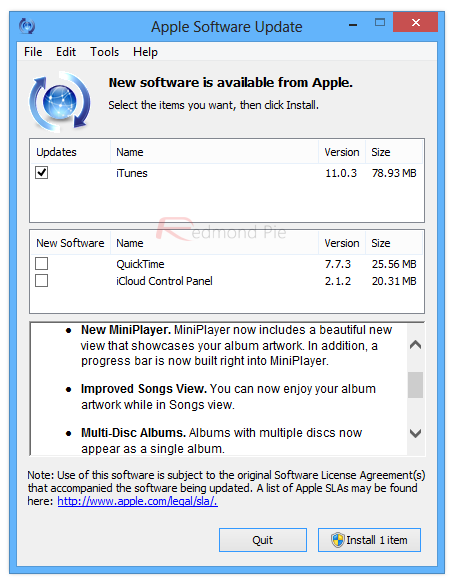The wait for the arrival of iTunes 11 was certainly extensive, and although we always knew it would be arriving at some point in 2012, we didn’t perhaps foresee that we’d be waiting right until the very end of the year to sink our teeth into it. Still, in terms of major bugs and issues, the latest and greatest release has been relatively incident-free, and to continue in that vein, Apple has just released iTunes 11.0.3 with a couple of minor improvements.
Following the initial release of iTunes 11 back on November 30th, a swift update was dropped just two weeks later amending issues pertaining to iCloud, among other bug fixes and performance enhancements. Things then remained quiet until the February update to iTunes 11.0.2 bringing Composer View, which makes today’s bump the third since that initial release.

This time around iTunes 11.0.3 adds a couple new features to the mix, including MiniPlayer improvements, enhanced Songs View, and multi-disc albums. Certainly not what you would call a groundbreaking update, by any stretch of the imagination, but these modifications are more than welcome, and essential to improving the overall fluidity and ease-of-use.

It’s fair to say that, due to the significant changes to the overall iTunes UI, some consumers had a touch of difficulty familiarizing themselves with the new navigation. Many I have spoken to don’t seem to like it at all, but whatever your personal opinions may be regarding the look and feel of iTunes 11, I do think it is substantially more functional than the old iTunes 10, if not less bloated.
You can update your iTunes right now by going via the Software Update route in your app, or if you don’t currently run iTunes on your Windows or OS X machine, you can simply point your browser to apple.com/itunes/download/ to obtain the latest version.

We’ve tested it on a MacBook Air running the latest and greatest OS X Mountain Lion, and also a Windows 8 machine, and everything seems to work as it should. Even though Apple maintains the iTunes software a lot more efficiently than it used to, often bugs can easily slip through the net, and if you do spot any, be sure to let us know by dropping a comment below.
You can follow us on Twitter, add us to your circle on Google+ or like our Facebook page to keep yourself updated on all the latest from Microsoft, Google, Apple and the web.

